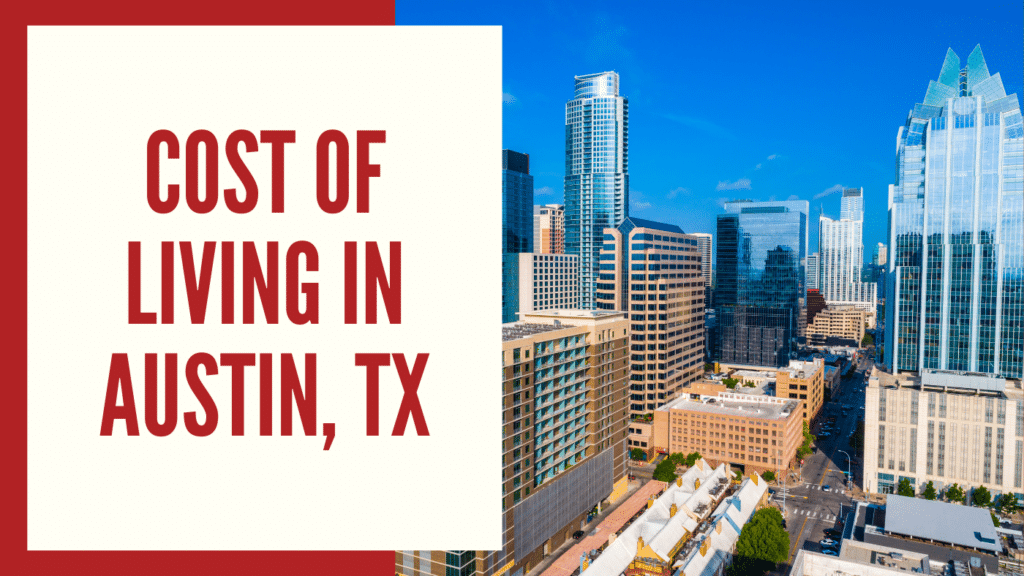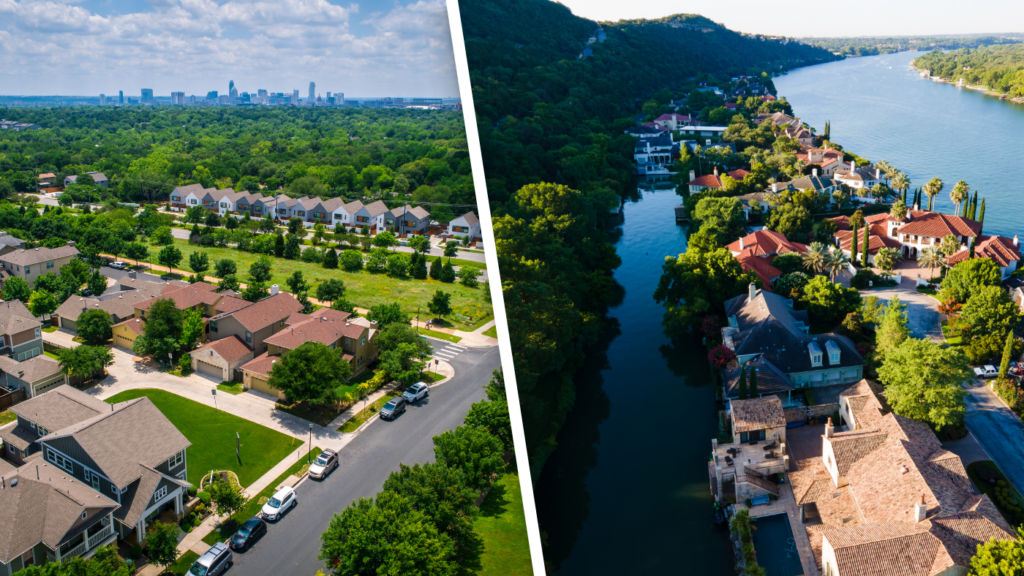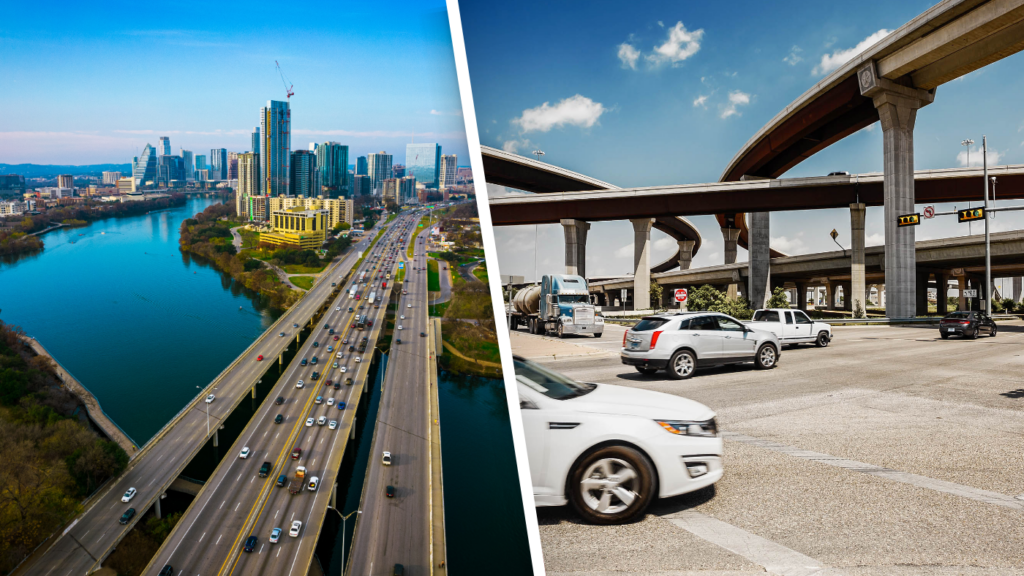
Relocating to a new city brings a blend of excitement and practical questions—especially when it comes to understanding the cost of living.
Austin, Texas, a city known for its vibrant culture, booming job market, and friendly atmosphere, has attracted many new residents seeking a balanced lifestyle. But what does it truly cost to live in the heart of Texas?
Getting a handle on Austin’s cost of living is crucial to planning your move. From housing prices to dining costs, transportation, and entertainment, there’s a lot to consider when budgeting for life in this energetic city. In this guide, we’ll dive into the costs associated with living in Austin, giving you a clear view of what it takes to thrive here. Many find Austin’s unique lifestyle, amenities, and opportunities well worth the investment.
Table of Contents
Cost of Living in Austin, TX
Austin’s cost of living is often seen as a mix of higher-than-average expenses alongside unique, budget-friendly advantages. With a strong local economy, the city’s overall cost of living index sits around 129.1, making it 29.1% above the national average. Yet, the lifestyle perks that come with this price tag can make it worthwhile for many residents, from young professionals to families.
Understanding the Cost Index
For prospective residents, Austin’s higher cost of living might seem daunting, but it’s important to recognize the factors behind it. The city’s housing market and quality of amenities, along with an above-average job market, contribute to these costs. Here’s what to expect:
- Housing Expenses: Housing is often the biggest cost for Austinites, with the median home price at about $544,638 and the average monthly rent for a one-bedroom apartment between $1,390 and $1,470.
- Income Requirements: A single resident typically needs an annual income of around $58,800 to live comfortably, while families may require closer to $110,520.
- Comparison to Other Cities: Austin’s cost of living may be higher than the national average, but it remains lower than major cities like Los Angeles and San Francisco.
A thorough look at Austin’s housing, transportation, and lifestyle costs will show how these numbers balance out in day-to-day life.
How Much Does Housing Cost in Austin?

Housing prices have steadily increased as Austin’s appeal continues to grow. Whether renting or buying, housing expenses remain one of the most significant aspects of Austin’s cost of living, especially compared to smaller Texas towns. However, Austin’s charm, combined with its booming tech industry, has made it a hot spot for relocation.
Housing Market Overview
Homebuyers have a range of options in Austin, from modest single-family homes to high-end properties along the waterfront. Austin’s neighborhoods also offer a spectrum of pricing, allowing residents to find something suited to both their budget and lifestyle. Here’s a snapshot of Austin’s housing market:
- Median Home Prices: Average home prices range from $500,000 in suburban areas to over $4 million for properties with city or waterfront views.
- Rental Rates: Studio apartments start around $1,500 monthly, while larger three-bedroom rentals can exceed $2,000.
- Popular Neighborhoods: West Austin offers premium homes, while areas like South Austin and East Austin may offer more budget-friendly options.
Although the housing market can be competitive, these diverse price points and neighborhood vibes make it possible for many people to find a home that fits both their budget and lifestyle.
Utility Costs in Austin: What to Expect

Austin’s utility costs vary seasonally but tend to be manageable overall, allowing residents to allocate more of their budget to other expenses or lifestyle pursuits. Whether renting an apartment or owning a home, utilities will be a part of your monthly costs, with expenses for electricity, water, and internet among the most common.
Monthly Utility Breakdown
Here’s a closer look at what you can expect for utilities in Austin:
- Electricity Bills: Ranging from $60 in the winter to as high as $140 in the summer.
- Water Charges: From $7 for individuals to around $35 for larger households.
- Internet Services: Basic plans cost around $50 per month, while high-speed, unlimited data packages reach up to $96.
- Trash Collection: Costs range between $23.30 to $50, depending on bin size.
Considering these costs as you create your Austin budget will give you a clearer idea of monthly expenses, helping you better plan for life in the city.
Cost of Food in Austin

Austin’s food scene is one of its most celebrated attractions. From casual taco stands to upscale restaurants, Austin offers a vast range of dining options. However, food costs vary depending on whether you prefer to cook at home or dine out regularly.
Grocery Costs
For those who primarily cook at home, grocery prices in Austin are close to the national average. H-E-B, Texas’s favorite grocery chain, is known for quality produce and competitive prices, making it a go-to for many locals.
- Monthly Grocery Expenses: Around $300 for an individual; costs can rise with family size.
- Sample Grocery Prices: Bread costs around $2.79, while a gallon of milk is about $1.40.
Dining Out
Eating out in Austin provides a mix of affordable eats and high-end options:
- Casual Dining: Around $15 per meal for basic sit-down spots.
- Fine Dining: Upscale restaurants can reach $50 or more per person.
- Fast Food Options: Ranges from $8 to $12 per meal.
Balancing groceries with the occasional meal out can allow Austin residents to enjoy the city’s unique culinary offerings without overspending.
Transportation Costs in Austin

Austin is largely a car-dependent city, with most residents driving to work or other daily destinations. Public transit is available through Capital Metro, but the overall layout of Austin favors car use, making gasoline and vehicle maintenance regular expenses.
Public Transit Options
Public transit in Austin includes buses and a limited rail line, which is more affordable than driving but may require planning depending on your neighborhood.
- Capital Metro Bus Fare: $1.25 per ride, with monthly passes at $41.25.
- MetroRail Fares: $3.50 per ride, with a monthly pass costing $96.50.
Driving is often the preferred option, with gas prices ranging from $2.85 to $3.07 per gallon. For those who work downtown or in busy areas, parking fees can also add up, making it important to factor this in if you’re budgeting for Austin life.
Healthcare Costs in Austin

Healthcare costs in Austin are generally lower than the national average, with local options for every type of health need. Regular doctor visits, specialist care, and dental services can be a relatively affordable part of life in Austin, especially if you have health insurance.
Medical Service Costs
Typical healthcare costs include:
- Primary Care Visits: Around $110 per visit.
- Dental Checkups: Average of $95 per appointment.
- Prescription Costs: Around $439 annually for insured individuals.
- Veterinary Visits: Around $52 per appointment.
Residents often find Austin’s healthcare system accommodating, with several renowned hospitals and a variety of clinics throughout the city to support wellness needs.
Average Salaries in Austin

Austin’s job market is flourishing, especially within the tech industry, making it one of the top cities for career growth in Texas. With the rise of tech giants like Tesla, Google, and Apple setting up headquarters or significant offices here, the average salaries across various sectors have been positively impacted. Here’s a breakdown of what you can expect in terms of income by profession and industry.
Salary Overview by Industry
Austin’s booming economy provides opportunities across a range of industries. Here are some average annual salaries:
- Tech Industry: Software engineers and developers often see salaries between $77,175 per year and $140,000, with senior roles reaching upwards of $180,000.
- Healthcare: Registered nurses in Austin earn around $81,430 per year, while physicians and specialists often make over $150,000.
- Finance and Accounting: Accountants and financial analysts earn around $68,969 annually, depending on experience and position.
- Education: Austin’s educators, including teachers and administrators, make an average of $58,000, though specific roles and districts can vary.
- Construction and Trades: Skilled trades, such as electricians and carpenters, earn between $40,000 and $65,000 per year.
With a favorable job market and steady growth, Austin’s average salaries can support a comfortable lifestyle, especially for those in high-demand industries. For professionals considering a move to Austin, there is strong income potential across many fields, which, in combination with the city’s amenities, makes for an appealing career destination.
FAQ About the Cost of Living in Austin, TX
Is Austin’s cost of living higher than other Texas cities?
Yes, Austin’s cost of living is higher than cities like Dallas, Houston, and San Antonio, primarily due to the competitive housing market. However, Austin offers a vibrant lifestyle, a growing job market, and unique local amenities that offset these higher expenses for many residents.
What salary do you need to live comfortably in Austin?
A single person typically needs an annual salary of around $58,000 to $60,000 to live comfortably, accounting for housing, food, transportation, and discretionary spending. Families, on the other hand, may need around $122,229 annually, depending on their lifestyle and housing needs.
Is public transportation a viable option in Austin?
Public transportation, provided by Capital Metro, is available but limited in comparison to cities with extensive transit systems. Austin residents often rely on cars due to the city’s spread-out layout, but those in the downtown area or along public transit routes can make use of buses and MetroRail for commuting.
What’s the tax situation in Austin?
Texas does not have a state income tax, which is a significant financial advantage for residents. However, property taxes in Austin can be relatively high, often around 2% to 2.5% of a home’s assessed value. While property taxes can impact homeowners, the absence of state income tax can lead to substantial savings.
Thinking About Moving to Austin?
Whether you’re drawn to Austin’s tech opportunities, vibrant culture, or outdoor activities, our relocation specialists are ready to help. We can guide you through the process and connect you with neighborhoods, properties, and resources to make your transition smooth and successful. Submit the form below to reach out to our relocation specialists, and let’s make Austin your new home!
Resources:





